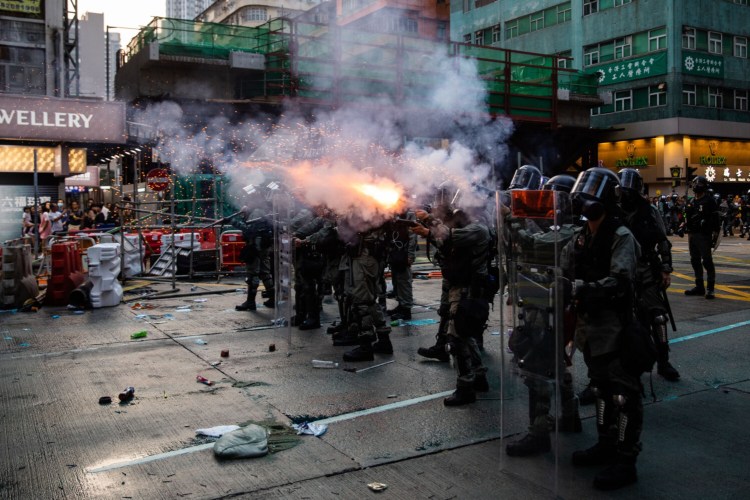Congress last week stood up for Hong Kong’s threatened freedoms by approving a bill that opens the door to possible sanctions — and at the same time binds the autonomous region up in the U.S.-China trade dispute. The next move belongs to President Trump, who could finally offer Hong Kong’s protesters some badly needed moral support by signing the bill.
Hong Kong ostensibly stands apart from the rest of China, which since 1999 has for the most part left the region to govern its own internal affairs, retain its independent judiciary and respect its residents’ civil rights. Its special status has also exempted Hong Kong from the tariffs and other trade sanctions that the Trump administration began imposing on Beijing last year.
But Hong Kongers have periodically felt the long arm of Beijing, notwithstanding the official promise of autonomy for another 30 years.
In February, that reach came in the form of a proposed extradition bill that could have permitted Hong Kongers to be sent to mainland China for prosecution. Widespread demonstrations led to the withdrawal of the bill, but that didn’t stop the protests, which have only intensified. Protesters’ demands now include voting rights, amnesty for demonstrators and an inquiry into police violence.
Protests this week at Hong Kong Polytechnic University turned into a siege as police fired tear gas and rubber bullets, and protesters hurled Molotov cocktails and shot arrows.
Last week, soldiers from the Hong Kong garrison of the People’s Liberation Army (mainland China’s military) helped clean debris from streets. The move was widely seen as a warning that the army stood ready to suppress protests.
As Trump has alternately scolded and courted China over trade, he has been disappointingly silent over Hong Kong, its special status and the rights of its people. That’s in marked contrast to his criticism of Iran, where protests over gasoline prices have turned violent.
On Tuesday, the Senate on a bipartisan vote passed the Hong Kong Human Rights and Democracy Act, which would require the secretary of State to certify annually whether Hong Kong remains sufficiently autonomous from China to keep the special trade status intact. The House of Representatives followed suit on Wednesday, also on a bipartisan vote.
A companion bill prohibits U.S. sales to Hong Kong of tear gas, pepper spray, rubber bullets, water cannons, stun guns and similar policing equipment.
The bill may complicate the ongoing trade negotiations between the U.S. and China, but Trump should embrace it anyway. The U.S. should offer its official support to Hong Kongers as they defend their liberties — and as they insist that Beijing keep its commitments on Hong Kong autonomy.
Editorial by the Los Angeles Times
Visit the Los Angeles Times at www.latimes.com
Distributed by Tribune Content Agency, LLC.
Send questions/comments to the editors.



Comments are no longer available on this story